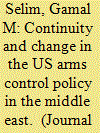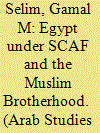| Srl | Item |
| 1 |
ID:
109500


|
|
|
| 2 |
ID:
145627


|
|
|
|
|
| Summary/Abstract |
This article seeks to examine the dynamics of counter-revolution in Egypt following the January 2011 revolution and their corresponding impact on the path of democratization in post-Mubarak Egypt. It argues that the popular calls for change that followed the Egyptian revolution have fallen repeatedly and quickly into the hands of a structural alliance of reactionary and constancy-oriented actors operating at the internal and external levels. These included the Egyptian Supreme Council of the Armed Forces (SCAF), the Muslim Brotherhood, and the United States with its intrusive global structure, all of which have emerged as agents of continuity and counter-revolution in post-Mubarak Egypt, in turn complicating any proposed genuine democratic transition.
|
|
|
|
|
|
|
|
|
|
|
|
|
|
|
|
| 3 |
ID:
183880


|
|
|
|
|
| Summary/Abstract |
The outbreak of the Egyptian 2011 revolution raised expectations in academic and policy-oriented circles that Egypt would chart a new foreign policy discourse in response to the demands of its revolutionary public and the competing political forces that sought to shape its power. This article examines the development of Egyptian foreign policy after the 2011 revolution, with a view of identifying the patterns of continuity and change and their primary underlying causes. The article contends that, contrary to expectations, the elements of continuity were far more powerful than propensities for change during period of SCAF and Morsi where the revolutionary sentiment in Egyptian politics was at its peak. While the rise of Sisi to power seemed to have ended the revolutionary zeal in contemporary Egypt, it was only then that Egypt’s foreign policy has witnessed the most relatively significant change in the last 40 years.
|
|
|
|
|
|
|
|
|
|
|
|
|
|
|
|
| 4 |
ID:
124604


|
|
|
|
|
| Publication |
2013.
|
| Summary/Abstract |
This article purports to examine the role of the United States in the outbreak of the Arab Spring and the course of its subsequent paths. The main argument of this article is that the Arab Spring represented a major strategic surprise to the United States. It did not plan or facilitate the Arab Spring as the Tunisian, Egyptian, Yemeni and Bahraini regimes were performing to the best satisfaction of American interests in the Arab world. As the Arab Spring carried with it threats to American regional interests, the United States moved to secure its interests by steering Arab uprisings towards courses of action which best suit these interests.
|
|
|
|
|
|
|
|
|
|
|
|
|
|
|
|